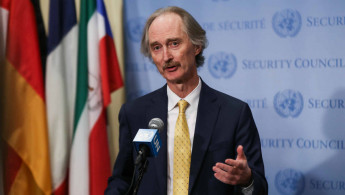UN envoy wants "Syria-led" committee to draft new constitution
The new UN special envoy for Syria said on Thursday his goals in the period ahead are to achieve "concrete action" on detained and missing people and the convening of a "Syrian-led and owned" committee to draft a new constitution for the war-torn country "as soon as possible".
Norwegian Geir Pedersen, who last month became the fourth United Nations negotiator working to resolve almost eight years of bloodshed in Syria, said he also wants to begin a sustained dialogue with the government and opposition "on building trust and confidence".
This is in order to engage a wide-range of Syrians, and to help the international community deepen its dialogue on achieving a political settlement, he said.
Pedersen's first briefing to the UN Security Council indicated a much broader approach to trying to end the war than his predecessor, Staffan de Mistura, who spent his last year trying unsuccessfully to form a constitutional committee.
Pedersen focused on a resolution the council adopted in December 2015 which endorsed a road map for peace. It contains "all the elements for a political solution," he said, and calls for "a truly Syrian-led and owned political process" which he stressed is key if any peace deal is to be sustained.
The Security Council has been deeply divided over Syria, with the US and its allies backing the opposition and Russia and China supporting Syrian President Bashar al-Assad's regime along with Iran and other countries. This division has led to a near-paralysis of the UN's most powerful body.
Pedersen said he believes "there are real possibilities for strengthening international support," and a need to be "creative."
"If we are to see how issues can be unblocked and how to help the parties move in a Syrian-led and Syrian-owned process, a common forum where key states engage seriously on those issues may be needed," he said without elaborating.
As he deepens discussions with the government and opposition, Pedersen said, "I sense a wide acceptance of the notion that convening a credible, balanced, inclusive and viable Syrian-led and owned constitutional committee, under UN auspices in Geneva, can be important to revitalise the political process."
Pedersen expressed hope that "we can finalise the rules of procedure and the composition of the committee in the near future."
De Mistura ended his four-year tenure late last year with an abortive push to form a committee tasked with drawing up a post-war constitution after seeing repeated rounds of talks in Geneva come to nothing.
Pedersen, a career diplomat, has said he hoped he would be able to overcome the obstacles to creating the committee.
Urgent Issues
Pedersen said some challenges must be addressed urgently, citing the last IS stronghold in the village of Baghouz and the last rebel-held province of Idlib.
IS have been defending the last square mile of their "caliphate" in Baghouz, eastern Syria, as Kurdish-led fighters of the Syrian Democratic Forces (SDF) are preparing for a final onslaught against them.
The SDF face a humanitarian crisis as it struggles with the intake of thousands of civilians fleeing the area.
The recent intensification of Syrian regime airstrikes in Idlib killed two people on Tuesday, despite the area being covered by a ceasefire zone agreed between Russia and Turkey last year.
Russia's UN Ambassador Vassily Nebenzia expressed hope that parties "will manage to achieve mutually acceptable solutions on the Idlib de-escalation zone and also the northeast."
Daunting task
Pedersen has acknowledged he was facing a daunting task of rekindling moribund peace talks and succeeding where his three predecessors failed.
Since the start of January, he has been travelling extensively to meet with the Syrian government, the opposition and others to try to move the process forward.
The Syrian conflict began when the Baath regime, in power since 1963 and led by President Bashar al-Assad, responded with military force to peaceful protests demanding democratic reforms during the Arab Spring wave of uprisings, triggering an armed rebellion fuelled by mass defections from the Syrian army.
According to independent monitors, hundreds of thousands of civilians have been killed in the war, mostly by the regime and its powerful allies, and millions have been displaced both inside and outside of Syria.
The brutal tactics pursued mainly by the regime, which have included the use of chemical weapons, sieges, mass executions and torture against civilians have led to war crimes investigations.
Agencies contributed to this report.





 Follow the Middle East's top stories in English at The New Arab on Google News
Follow the Middle East's top stories in English at The New Arab on Google News
![Netanyahu furiously denounced the ICC [Getty]](/sites/default/files/styles/image_330x185/public/2024-11/GettyImages-2169352575.jpg?h=199d8c1f&itok=-vRiruf5)
![Both Hamas and the Palestinian Authority welcomed the ICC arrest warrants [Getty]](/sites/default/files/styles/image_330x185/public/2024-11/GettyImages-2178351173.jpg?h=199d8c1f&itok=TV858iVg)
